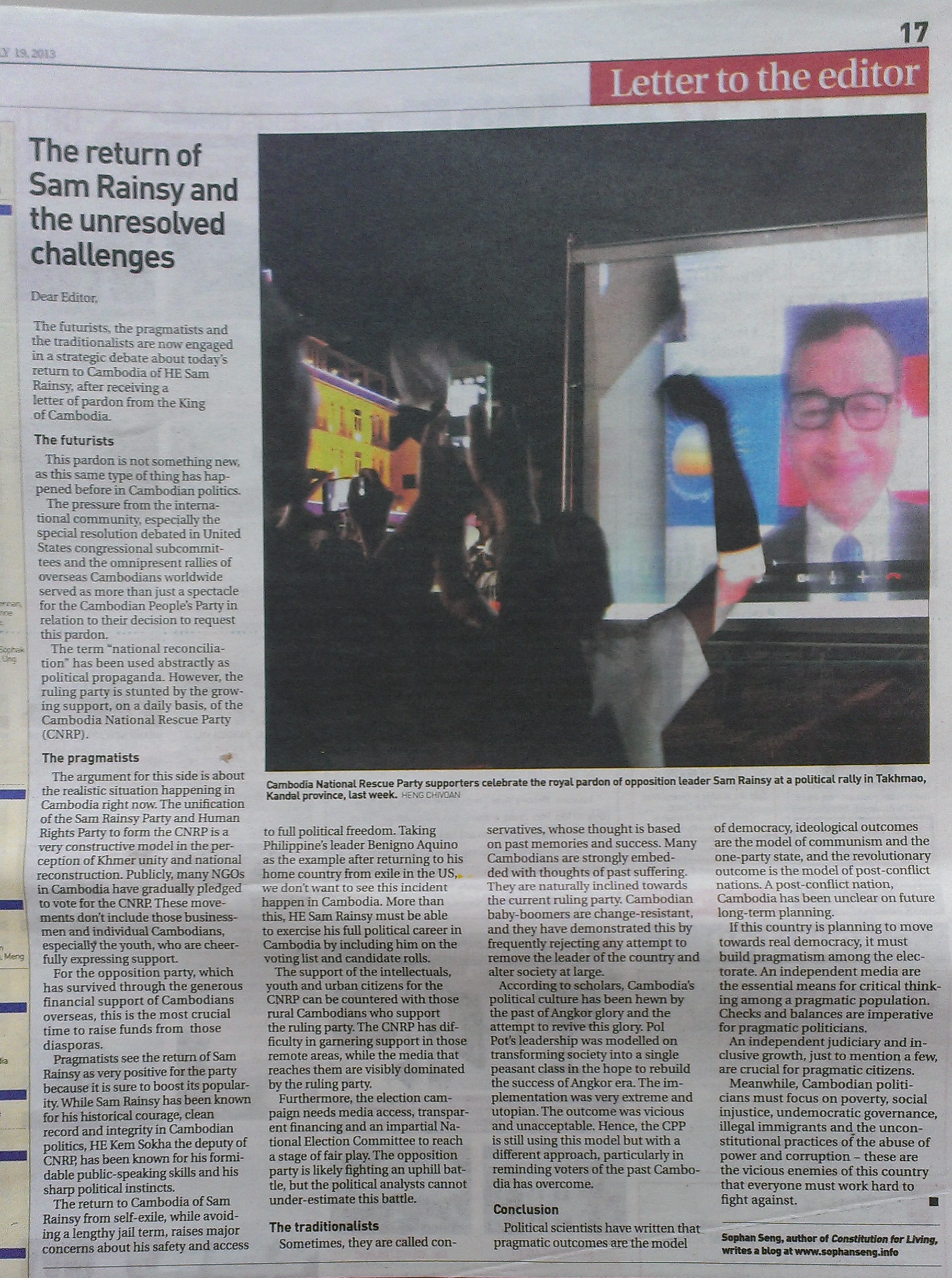The Return of Sam Rainsy and the Unresolved Challenges
Dear Editor;
 The futurists, the pragmatists and the traditionalists are now engaged in the state of strategic debate about today’s return to Cambodia of HE Sam Rainsy, after receiving a letter of pardon from the King of Cambodia.
The futurists, the pragmatists and the traditionalists are now engaged in the state of strategic debate about today’s return to Cambodia of HE Sam Rainsy, after receiving a letter of pardon from the King of Cambodia.
The Futurists
This pardon is not something new as this same type of thing has happened before in Cambodian politics.
The pressure from the international community, especially the special resolution debated in the congressional’s subcommittees and the omnipresent rallies of overseas Cambodians worldwide served as more than just a spectacle for the Cambodian People’s Party in relation to their decision to request this pardon.
The term of “national reconciliation” has been used abstractly as political propaganda. However, the ruling party is stunted by the growing support, on a daily basis, of the Cambodia National Rescue Party (CNRP).
The Pragmatists
The argument for this side is about the realistic situation happening in Cambodia right now. The unification of Sam Rainsy Party and Human Rights Party to form the CNRP is a very constructive model in the perception of Khmer unity and national reconstruction. Publicly, many NGOs in Cambodia have gradually pledged to vote for the CNRP. These movements don’t include those businessmen and individual Cambodians, especially the youth, who are cheerfully expressing support.
For the opposition party who has survived through the generous financial support from Cambodians overseas, this is the most crucial time to raise funds from those diaporas.
Pragmatists see the returning of Sam Rainsy as very positive for the party because it is sure to boost its popularity. While Sam Rainsy has been known for his historical courage, clean record and integrity in Cambodian politics, HE Kem Sokha who is deputy of CNRP has been known for his formidable public-speaking skills and his sharp political instincts.
The return to Cambodia of Sam Rainsy from self-exile, while avoiding a lengthy jail term, raises major concerns about his safety and access to full political freedom. Taking Philippine’s Leader Benigno Aquino as the example after returning to his home country from exile in the US, we don’t want to see this incident happen in Cambodia. More than this, HE Sam Rainsy must be able to exercise his full political career in Cambodia by including him in the voting list and candidate rolls.
The support of the intellectuals, youth and urban citizens for the CNRP can be countered with those rural Cambodians who support the ruling party. CNRP has difficulty in garnering support in those remote areas, while the media that reaches them are visibly dominated by the ruling party.
Furthermore, the election campaign needs media access, transparent financing and an impartial National Election Committee NEC to reach a stage of fair play. The opposition party is likely fighting an uphill battle but the political analysts cannot under-estimate this battle.
The Traditionalists
Some time, they are called conservatives, whose thought is based on past memories and success. Many Cambodians are strongly embedded with thoughts of past suffering. They are naturally inclined to the current ruling party. Cambodian baby-boomers are change -resistant, and they have demonstrated this by frequently rejecting of any attempt to remove the leader of this country and alter society at large.
According to scholars, Cambodian political culture has been hewn by the past of Angkor glory and the attempt to revive this glory. Pol Pot’s leadership was modelled on transforming society into a single peasant class in the hope to rebuild the success of Angkor era. The implementation was very extreme and utopian. The outcome was vicious and unacceptable. Hence, the CPP is still using this model but with a different approach, particularly in reminding voters of the past Cambodia has overcome.
Conclusion
Political scientists have written that pragmatic outcomes are the model of democracy, ideological outcomes are the model of communism and one-party state, and the revolutionary outcome is the model of post-conflict nations. a post-conflict nation, Cambodia has been unclear on future long-term planning.
If this country is planning to move towards real democracy, it must build pragmatism among the electorate. An independent media are the essential means for critical thinking among a pragmatic population. Checks and balances are imperative for pragmatic politicians. An independent court and inclusive growth, just to mention a few, are crucial for pragmatic citizens.
Meanwhile, Cambodian politicians must focus on poverty, social injustice, undemocratic government, illegal immigrants, and the unconstitutional practices of abuse of power and corruption-these are the vicious enemies of this country that everyone must work hard to fight against
Sophan Seng, author of Constitution for Living, writes a blog at www.sophanseng.info .
